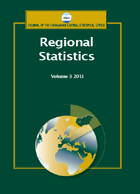The spatial peculiarities of economic and social convergence in Central and Eastern Europe
The spatial peculiarities of economic and social convergence in Central and Eastern Europe
Author(s): Tamás Tánczos, Zoltán EgriSubject(s): Social Sciences, Economy, Geography, Regional studies
Published by: Központi Statisztikai Hivatal
Keywords: convergence; catch-up effect; economic performance; well-being; spatial econometrics
Summary/Abstract: This study examines the convergence and catch-up effects of the economic and social (well-being) performance of the NUTS 2 regions of Central and Eastern Europe between 2004 and 2014. The separate management of these two develop-ment dimensions is justified by the fact that they have no clear relationship. In the study, the theory of closed economies is abandoned and, thus, the performed regression analyses include spatial interactions and spillover effects. As the applied regressions provide only an average picture about the studied phenomenon, the authors also present the individual paths for each region.The results confirm the theory of absolute convergence for both the economic and social convergence. Thus, regardless of any other explanatory factor, less developed regions tend to converge with the more developed ones. The traditional examinations and those that assess spatiality aspects point to a faster annual convergence rate of well-being, so the two phenomena have different dynamics. This is partly supported by the individual regional catch-up paths. Furthermore, it clearly complements the mathematical-statistical results. The novel results highlight the catching up of the ‘local dimension’ that puts the regions along the two dimensions as ‘catch-up not complete’ and ‘catch-up complete’. The authors’ results suggest a non-parallel way of achieving social and economic cohesion.
Journal: Regional Statistics
- Issue Year: 8/2018
- Issue No: 01
- Page Range: 49-77
- Page Count: 29
- Language: English

